Smartphone ownership is quickly becoming the norm. According to the Pew Research Center’s “Technology Device Ownership: 2015” survey, released last fall, almost 70 percent of U.S. adults now own a smartphone, up from 35 percent in 2011. And 45 percent now own a tablet, up from ten percent in 2011. The 2015 Allstate/National Journal Heartland […]
Resources from Mobile MegaShare | ISTE 2015
The free exchange of resources and tips was fast and furious at the Mobile MegaShare, an ISTE 2015 preconference, held June 27 in Philadelphia.
Meet the Tabletarians | Mobile Services
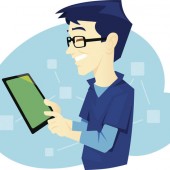
In March 2011, the Boise Public Library (BPL), ID, used $3,300 in Library Services and Technology Act (LSTA) grant funding to purchase four iPad 2 tablets and all of the trimmings. As it turned out, BPL may have been a couple of years ahead of its time. This conversation is now coming full circle. Technological advances continue to make tablets lighter, faster, and more affordable. Vendors have recently launched interfaces that make it possible to use a staff tablet to perform tasks ranging from weeding books to signing up new cardholders. Also, applying lessons learned about these devices during the past five years, many libraries are rebooting or enhancing the way tablets are integrated into roving reference, off-site programs, and other workflows.
Librarians, IT Experts Respond to Adobe Spying Accusations
Augmented Library
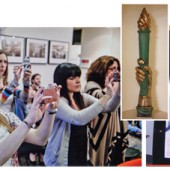
In early April 2013, digital journalism professor Robert Hernandez, of the University of Southern California (USC) Annenberg School for Communication and Journalism, Los Angeles, was driving by L.A.’s Central Library downtown while thinking of ideas for his experimental augmented reality (AR) storytelling and journalism course when he had an aha moment: Why not focus a project on augmenting the Central Library?
Library Simplified Works on Three-Click Access for Library Ebooks | ALA 2014

Library ebook transactions remain too lengthy and complicated for patrons, especially in comparison with consumer ebook transactions, James English, product manager for the Library Simplified project at the New York Public Library (NYPL) said during his “EPUB: Walled Gardens and the Readium Foundation” presentation at the National Information Standards Organization (NISO) Book Industry Study Group (BISG) Eighth Annual Forum, held June 27 in conjunction with the American Library Association (ALA) 2014 Annual Conference. The group is working to make an open, commercial-grade ereader for libraries that would greatly simplify this process.
Capira Integrates StackMap into Mobile App
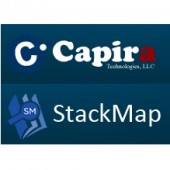
Library software and mobile app developer Capira Technologies this week announced an integration with StackMap, a bookshelf visualization platform that helps guide patrons directly to the location of books and other materials in the library. Using the app, patrons will be able to search for and discover items in a library’s catalog, and with one […]
Harvard Study Examines Youth View on Technology Use in Schools
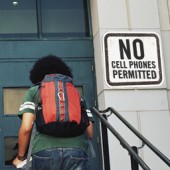
A new Harvard study examines US students’ attitudes towards technology in schools. Although 78 percent own cell phones, activating them in schools is restricted, which frustrates students. Students also express frustration with school’s limited WiFi access, Internet filtering, monitoring, and the push to embrace tablet computers.
In Testing Stage, Boopsie Analytics Spots Shift from Apple to Android
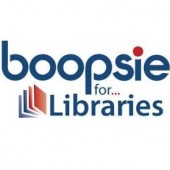
Boopsie, the developer of custom mobile apps for libraries, is planning to launch Boopsie Analytics in early 2014. Currently in alpha testing stage, the new web-based platform will help the company’s customers analyze data about a number of different patron behaviors, such as how many queries are sent to a database or catalog from the app each day or each week, what services are being accessed most often via the app, or how many titles are being downloaded from OverDrive or other vendor partners using the app, for example.
Four Librarians, Four E-readers, Two Years
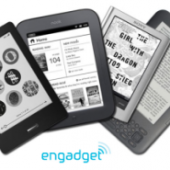
Two years ago, four librarians at Oregon State University shared initial thoughts about using dedicated e-readers for the first time. We had just launched a year-long study of academic librarian use of e-readers and were excited to share our new-found joys along with concerns about the four e-readers used in the study. Two years later, the study is finished (look for the study results later this fall in Journal of Library Innovation), and the mobile reading landscape has changed significantly due to the introduction of many new and more versatile e-reading devices, especially tablets.

